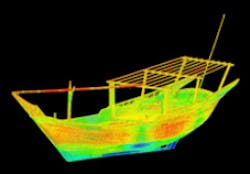Doha dhows scanned in 3D
A unique collection of traditional seagoing boats in Doha, Qatar has been recorded for posterity using a 3D scanner.
A team from the University of Exeter (Exeter, UK) surveyed 14 vessels from the National Museum of Qatar's collection of traditional dhows (boats) using a laser scanner to produce a highly accurate three-dimensional record of each craft.
The team worked at the National Museum of Qatar's boatyard in Doha port for a month, recording the vessels using a Leica HDS 6000 Laser scanner. In addition to scanning the boats, the team is also using precisely calibrated digital photography to photograph the boats from the same vantage points as the scans. This will allow them to combine the scans and photographs to produce realistic digital models of each of the dhows.
The digital 3D models of each of the dhows, together with more traditional naval and orthographic drawings, will be used for conservation, research and public education purposes.
The project team included two maritime archaeologists Dr. John P. Cooper from the University of Exeter and Dr. Chiara Zazzaro from the University of Naples working with mines engineer Dr. Andy Wetherelt, also from the University of Exeter.
"It is hugely important to produce a digital record of the boats for the purpose of conservation and recording. In the past the builders, even of the biggest and most complex dhows, built these vessels without relying on a single drawing. Their mental agility and planning skills were phenomenal. It's great that we can now explore this level of expertise using modern technology," says Dr Cooper.
The team completed 300 scans of the dhows by the end of the fieldwork phase. They have now started post-processing the collected data and will have completed 3D models of dhows by the end of August.
Related items from Vision Systems Design that you might also find of interest.
1. Scanner fingerprints products
Product development firm Cambridge Consultants (Cambridge, UK) has worked with Ingenia Technology (London, UK) to develop a laser scanner for use in brand protection, product authentication and track and trace applications.
2. Scanner measures evenness of roads
A team at the Fraunhofer Institute for Physical Measurement Techniques IPM (Freiburg, Germany) has developed the first laser scanner to be approved by the Federal Highway Research Institute for measuring the evenness of roads.
3. 3-D scanner images dental molds
Combining structured lighting, smart optics, and software, a 3-D scanner provides dental technicians with a faster way to image dental molds.
-- Dave Wilson, Vision Systems Design
